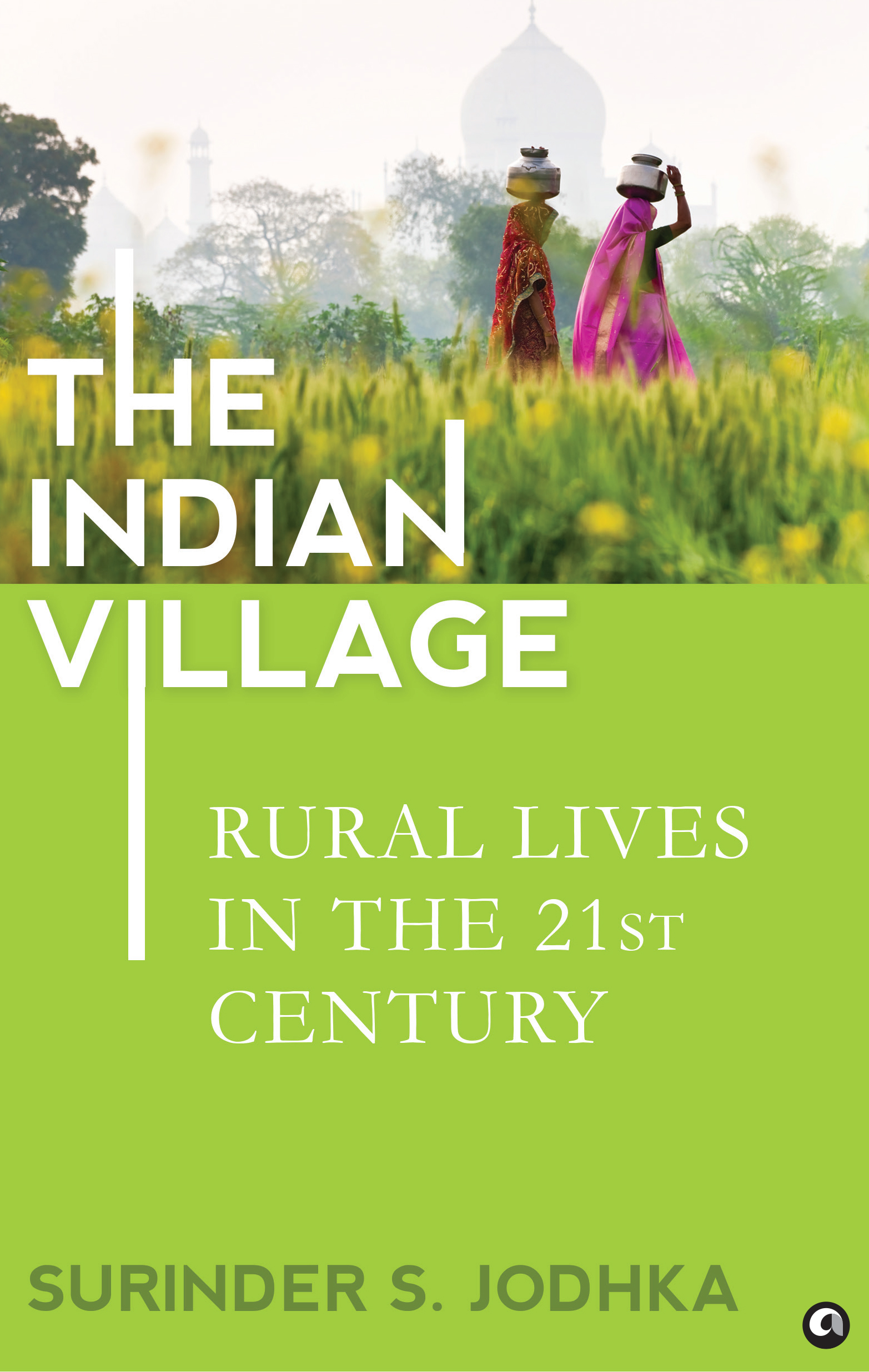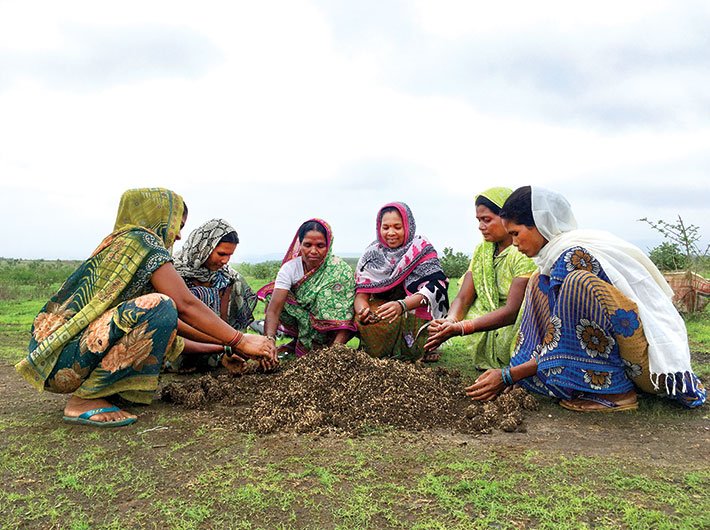Excerpt from sociologist Surinder S Jodhka’s new work that demystifies the much-talked-about ‘Indian village’
The Indian Village: Rural Lives in the 21st Century
By Surinder S. Jodhka
Aleph, 296 pages, Rs 799

‘India lives in its villages’.
This statement popularized by Mahatma Gandhi is often referred to in discussions about the country, its past, and its possible future. But what exactly is the Indian village? In the most basic sense, the ‘village’ is a kind of human settlement, always standing in contrast to the ‘town’ or ‘city’. Yet, it is also an idea, one which has undergone myriad shifts over the course of our nation’s history.
In ‘The Indian Village: Rural Lives in the 21st Century’, acclaimed sociologist Surinder S. Jodhka critically examines the changing nature of the village in India, both as an idea and as a lived reality. Reflecting on the colonial construction of India as a land of village republics, a representation that was turned on its head in different ways by Indian nationalists in the early twentieth century, and the post-liberalization nation, this book provides a detailed account of how rural lives have been transformed in India through the decades. The book also looks at India’s modern villages to showcase the current diversity within agrarian and rural realities with specific focus on the processes of development and democracy in rural areas.
The Indian village, the author suggests, is not a relic of the past. It has always been a dynamic reality and it lives on in an active relationship with the wider world. Besides its many other aspects and processes, it enables the city to prosper, just as the city keeps the village going. Radical, innovative, and grounded in impeccable scholarship, The Indian Village is a seminal study of rural India.
Jodhka, professor of sociology at Jawaharlal Nehru University, has extensively researched and published on the dynamics of caste in present times, aspects of the agrarian economy, changing patterns of social and political life in contemporary rural India, and the sociology of community identities.
Here is an excerpt from the book:
The Afterlives of Development
The disintegration of the erstwhile socialist bloc led by the Soviet Union in the late 1980s also revived the older theories of economic growth, now known as neoliberalism. Advocates of the neoliberal perspective aggressively argued for the withdrawal of the state from the sphere of economy and its reduced intervention as a regulator of markets. Free flow of global trade and markets was supposed to help reduce corruption within the state institutions and promote growth, which in turn was to presumably also generate resources for dealing with problems of poverty and hunger in countries of the Global South, the term that is currently used for the nation states that were earlier seen as part of the Third World.
However, it was also to a large extent ideologically inspired, reflecting the pro-market and small-government philosophy of neoliberalism, driven by the vision of a unified global capitalism. The International Monetary Fund (IMF) and the World Bank played a central role in promoting neoliberal policies in developing countries. These involved market liberalization, privatization, and government spending cuts; they were considered necessary to restore the confidence of international lenders and place borrowing countries back on the path of sustainable economic growth.
While global agencies and local corporate interests have been able to push for neoliberal policies through national governments, ‘development’ continues to be a popular idea as well as state practice across countries of the Global South. Notwithstanding the ideology and history of the term, a large majority of the poor and deprived in these countries continue to view development as offering something positive to them. As discussed in the opening section of the chapter, development has come to be seen as an aspect of citizenship entitlements, which helps in expansion of the rights of the poor and the marginalized, and promises them a good life. Eradication of poverty and social prejudice, which produce a variety of exclusions and discriminatory practices, are processes that every society has begun to pursue in the emerging global political order. They are also seen as important developmental goalposts by global agencies like the World Bank, UNDP, and IMF. Growing economic disparities as an outcome of neoliberal policies are increasingly becoming a source of worry for global agencies. Thus, some economists who initially promoted neoliberal reforms have come to realize that the idea of the withdrawal of the state from welfare measures as a strategy of growth has its limitations.
More importantly, development is increasingly also embedded in democratic politics. As Nobel Prize-winning economist and philosopher Amartya Sen rightly argues, it is only in democratic societies that the government policies tend to take the issues of the poor and socially excluded with some seriousness. In democratic countries, these issues often become part and parcel of the electoral political process and find reference in election manifestos across political parties, irrespective of their ideological positions on economic policies. Even when governments subscribe to neoliberal policies in principle, they continue to intervene in some critical spheres of economy and income distribution in order to provide some solace to those living on the margins.
It is in this context that contributions of the Nobel laureate Sen have been significant. Development, as he argues, is not simply a natural process of growing up or an evolutionary unfolding of the inherent potentials of an organism, a human person, or a nation state society. In the social context of present-day societies, it also has a political dimension and could produce profound political effects. It ought to be seen as a process that creates an enabling environment for common citizens, helping them ‘to lead lives they have reason to live’. Development, as he argues, should be seen as a kind of ‘freedom’.
Such a framing of development takes it beyond the conventional economic notion of the phrase, which defines it simply in terms of growth measured through the volume of ‘gross domestic product’ or the gross income of a country and the per-capita income of its inhabitants. More crucial than the volume and value of economic goods and services that the working population of a country produces is the need to focus on enhancing their capabilities, which would require the removal of major sources of unfreedom: poverty as well as tyranny, poor economic opportunities as well as systemic social deprivation, neglect of public facilities as well as intolerance or overactivity of repressive states.
What people can achieve (their capabilities) is influenced by economic opportunities, political liberties, social powers, and the enabling condition of good health, basic education, and the encouragement and cultivation of initiatives.
He goes on to identify ‘five types of interrelated freedoms, namely, political freedom, economic facilities, social opportunities, transparency and security’. As mentioned above, the agency that can enable the common people to overcome these hurdles is the state or the political system. Normally, it is only the state that has the resources, the legitimacy and the authority to ‘provide public education, health care, social safety nets, good macroeconomic policies, productivity and protecting the environment’.
Such ideas of development that advocate a focus on expanding human capabilities helped the UNDP to turn its focus towards ‘human development’, including the introduction of the Human Development Index (HDI), a composite system of measuring the average achievements of a country in terms of three basic dimensions of human development: a long and healthy life, as measured by life expectancy at birth; knowledge, as measured by the adult literacy rate and the combined gross enrolment ratio for primary, secondary, and tertiary schools; and a decent standard of living. This approach culminated in the formulation of the Millennium Development Goals (MDGs) by the United Nations in the year 2000. The MDGs put forward a challenge to the global community of nations to achieve some basic standards of living for their populations by 2015.
[The excerpt republished here with the permission of the publishers.]
